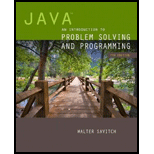
Explanation of Solution
Changing “DoubleException” to “Exception” in the “catch” statement:
By giving “Exception” in the place of “DoubleException” in the “catch” statement will not affect the output of the
Program:
The modified “catch” statement is highlighted below.
DoubleException.java:
//Define a class
public class DoubleException extends Exception
{
//Default constructor
public DoubleException()
{
//Call the method from parent class
super("Double exception thrown!");
}
//Parameterized constructor
public DoubleException(String message)
{
//Call the parent class's method
super(message + " " + message);
}
}
Main.java:
//Define the main class
class Main
{
//Define the main method
public static void main(String[] args)
{
//Try block
try
{
//Print the statement
System.out...
Want to see the full answer?
Check out a sample textbook solution
Chapter 9 Solutions
Java: An Introduction to Problem Solving and Programming plus MyProgrammingLab with Pearson eText -- Access Card Package (7th Edition)
- How can the standard error message be shown when an exception is thrown?arrow_forwardLet us assume that there is a catch handler that perfectly fits the kind of exception object being thrown. What are the circumstances in which exception objects of that type could be treated differently than they normally would be?arrow_forwardHas a catchphrase been used? What exactly does a finally clause mean? How do catch and finally operate in an exception program?arrow_forward
- JAVA Given a main program that searches for the ID or the name of a student from a text file, complete the findID() and the findName() methods that return the corresponding information of a student. Then, insert a try/catch statement in main() to catch any exceptions thrown by findID() or findName(), and output the exception message. Each line in the text file contains the name and the ID of a student, separated by a space. Method findID() takes two parameters, a student's name and a Scanner object containing the text file's contents. Method findID() returns the ID associated with the student's name if the name is in the file, otherwise the method throws an Exception object with the message "Student ID not found for studentName", where studentName is the name of the student. Method findName() takes two parameters, a student's ID and a Scanner object containing the text file's contents. Method findName() returns the name associated with the student's ID if the ID is in the file,…arrow_forwardLet's say there is a catch handler that exactly matches the exception object type. What are the conditions in which exception objects of that type could be handled differently?arrow_forwardSuppose there exists a catch handler that matches the exception object type perfectly. Under what circumstances may exception objects of this type be treated differently?arrow_forward
- PLZ help with the follwoing IN JAVA Suppose that statement2 causes an exception in the following try-catch block: Will statement3 be executed? If the exception is not caught, will statement4 be executed? If the exception is caught in the catch block, will statement4 be executed?arrow_forwardWhich of the following is a good example of the definition of a custom exception type?arrow_forwardAnswer the following questions based on your knowledge of java exception and java text and binary I/Os: Java exception can be handled locally using try-catch block or can be thrown to the calling When should you prefer to throw an exception to the calling method instead of using try-catch? Is it possible to write a program to read from a text file without handling the exception? Why should a programmer consider binary I/O instead of text I/O? Suppose that you are implementing a program to write a string “সিএিই-110” in a binary file. Java provides you three different methods – writeBytes(String), writeChars(String), and writeUTF(String). How many bytes will be written by each of those method for the give string? Why should not you consider the writeBytes(String) method in this case?arrow_forward
 Microsoft Visual C#Computer ScienceISBN:9781337102100Author:Joyce, Farrell.Publisher:Cengage Learning,
Microsoft Visual C#Computer ScienceISBN:9781337102100Author:Joyce, Farrell.Publisher:Cengage Learning, C++ Programming: From Problem Analysis to Program...Computer ScienceISBN:9781337102087Author:D. S. MalikPublisher:Cengage Learning
C++ Programming: From Problem Analysis to Program...Computer ScienceISBN:9781337102087Author:D. S. MalikPublisher:Cengage Learning

